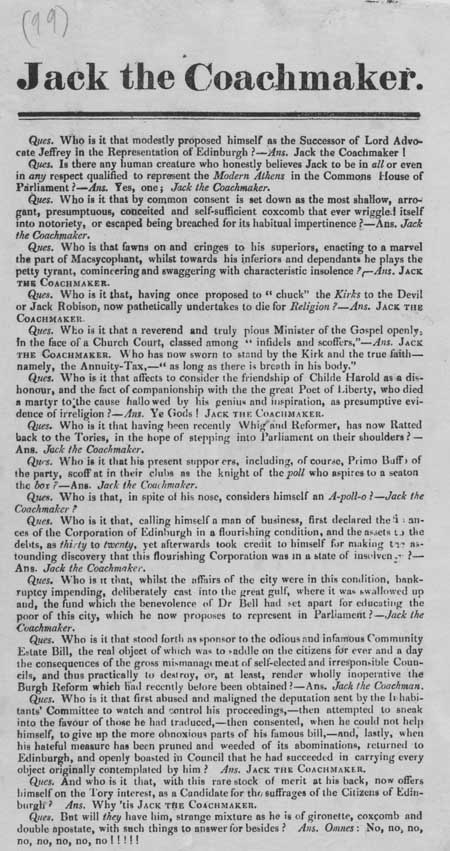Commentary
This political broadside begins: 'Ques. Who is it that modestly proposed himself as the Successor of the Lord Advocate Jeffrey in the Representation of Edinburgh? - / Ans. Jack the Coachmaker! / Ques. Is there any human creature who honestly believes Jack to be in all or even in any respect qualified to represent the modern Athens in the Commons House of Parliament? - / Ans. Yes, one; Jack the Coachmaker.' Although there are no publication details for this sheet, its subject matter suggests it was published during the 1830s. Written in the question and answer format of a catechism, this highly erudite sheet is a character assassination of a man who hoped to succeed Lord Francis Jeffrey (1773-1850) as MP for Edinburgh. Unfortunately, however, the proper name of this electoral candidate is not named, as the author merely refers to him throughout as 'Jack the Coachmaker'. No doubt this nickname would have identified him to people living at the time, thus highlighting the ephemeral nature of broadsides. The author ridicules 'Jack' for previously portraying himself as a Whig and Reformer, only to switch to the Tory Party if it improved his chances of being elected. The 'Poet of Liberty' referred to is Lord Byron (1788-1824). Broadsides are single sheets of paper, printed on one side, to be read unfolded. They carried public information such as proclamations as well as ballads and news of the day. Cheaply available, they were sold on the streets by pedlars and chapmen. Broadsides offer a valuable insight into many aspects of the society they were published in, and the National Library of Scotland holds over 250,000 of them.
View Transcription | Download PDF Facsimile
|
 |
Probable period of publication:
1830-1840 shelfmark: ABS.10.203.01(099)
 View larger image
View larger image
|


